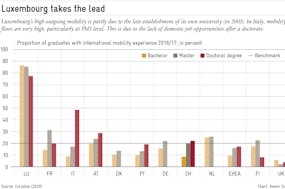At the end of July, Swiss media proudly reported the country had come top of the latest Global Innovation Index. The compilers had identified several factors behind Switzerland’s longstanding ability to innovate: first-class patent and copyright laws, the high-tech industry, the high quality of universities and the amount of investment in research and development.
Nevertheless, private enterprise remained the indisputable driver of Switzerland’s innovative strength, coughing up more than CHF 15 billion per year, or almost 70 percent, of total research and development spending.
However, the authors of the ranking also diagnosed considerable scope for improvement: regulatory hurdles for company start-ups remained relatively high. And there was a lack of risk capital for start-ups, especially those in the growth phase. This is stunning news considering Switzerland’s high private savings rate and pension funds with some CHF 1,000 billion in assets under management. So it is not entirely surprising that the vast majority of patents filed come from established companies rather than start-ups.
In addition to the untapped potential in the Swiss start-up scene, another factor causes concern: that spreading national anxiety about technological change are in general, ranging from skepticism to outright opposition.
Fearing the new world will destroy jobs and endanger health, the trade unions claim, for example, an e-mail ban for employees after work. They seem to ignore the fact that 6.2 million people in Switzerland already own a smartphone and many of them regularly look at their mobile phones when out of office.

Switzerland’s current recipe mix of regulation, public protests and state intervention is intended to stop or at least delay the age of technological development. (Blair Fraser, unsplash)
The latest 5G mobile phone standards provide another example. Some cantons have pronounced moratoria on the installation of 5G antennae, and every third 5G antenna project from Swisscom and Sunrise, the two biggest telecoms providers, faces appeals. That could delay the roll out of the 5G network for several years and might ultimately damp the country’s competitiveness. The great resistance to 5G antennae exemplifies the new, generally technophobic zeitgeist, ignoring the fact that the arrival of 5G would actually reduce the radiation exposure per data unit transmitted.
This evidence illustrates the whole socio-cultural ambiguity now prevalent in Switzerland. The country wants to be ahead in innovation. But at the same time, necessary provisions and necessary technical infrastructure are blocked. Parliament, to take another example, is extending a moratorium on genetic engineering every four years while knowingly ignoring new global research findings.
The latest example of political outrage involves the planned sponsorship of the Swiss Pavilion at Expo 2020 in Dubai by the Philipp Morris tobacco group. The anti-smoking lobby ignored the fact that the company had long started moving away from conventional cigarettes and was investing billions in substitute products for smokers. Whether this strategy will work or not should actually be left to the market.
And in yet another example of technophobia at federal level, a recent popular initiative proposed a general ban on e-voting, which could transfer Switzerland’s direct democratic system into the digital age, while not batting an eyelid about the collateral damage to Swiss citizens abroad or domestic residents with disabilities, who otherwise might find it hard to vote.
All these developments reflect a popular sentiment that regulation, public protest or state intervention should stop, or at least delay, technological development. If, however, Switzerland wants to lead the world’s most innovative countries, innovation must be encouraged, not delayed.





